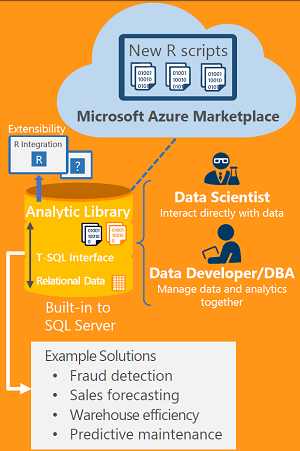News
'Always Encrypted' Leads New SQL Server 2016 Features
Microsoft said a new Always Encrypted security feature highlights its upcoming SQL Server 2016 -- "the biggest leap forward in Microsoft's data platform history" -- shipping this summer in a public preview.
The next major upgrade of the company's flagship relational database management system (RDBMS) was announced by CEO Satya Nadella at the company's inaugural Ignite conference today.
"To help customers with data security and compliance when using SQL Server on-premises or in the cloud, we are introducing Always Encrypted," company data guru T.K. "Ranga" Rengarajan wrote shortly afterward in a blog post. "Always Encrypted, based on technology from Microsoft Research, protects data at rest and in motion. With Always Encrypted, SQL Server can perform operations on encrypted data and best of all, the encryption key resides with the application in the customers trusted environment. Encryption and decryption of data happens transparently inside the application which minimizes the changes that have to be made to existing applications."
Although SQL Server and other traditional RDBMSes have been eclipsed by the hype of Hadoop-based Big Data initiatives featuring NoSQL stores of unstructured data, Microsoft still sees its granddaddy flagship as the bedrock of its enterprise data culture vision.
Key capabilities of SQL Server 2016 include "enhanced in-memory technologies with real-time operational analytics, new security and encryption technologies, built-in advanced analytics with the R language, and mobile BI for on-premises data," Microsoft said in a news release.
After highlighting the encryption feature, Rengarajan focused on a new "Stretch Database" capability.
"As core transactional tables grow in size, you may need to archive historical data to lower cost and to maintain fast performance," Rengarajan said. "This unique technology allows you to dynamically stretch your warm and cold transactional data to Microsoft Azure, so your operational data is always at hand, no matter the size, and you benefit from the low cost of using Microsoft Azure. You can use Always Encrypted with Stretch Database to extend your data in a more secure manner for greater peace of mind."
 [Click on image for larger view.]
Advanced Analytics with R (source: Microsoft)
[Click on image for larger view.]
Advanced Analytics with R (source: Microsoft)
In-memory online transaction processing (OLTP), a major focal point of SQL Server 2104's new functionality, is also getting an upgrade in the new edition. Rengarajan said users will now be able to apply the functionality to many more applications while also benefitting from enhanced concurrency. "With these enhancements, we also introduce the unique capability to use our in-memory columnstore delivering 100X faster queries with in-memory OLTP for in-memory performance and real-time operational analytics," Rengarajan said.
Big Data-style analytics in SQL Server 2016 will get a boost from Microsoft's acquisition of Revolution Analytics, which championed the R programming language used heavily in statistical analysis.
Rengarajan said Microsoft is using the acquired R technology to add a new advanced analytics workload to SQL Server 2016, joining the more traditional OLTP, data warehousing and business intelligence (BI) workloads.
"We want to make advanced analytics more accessible and increase performance for your advanced analytic workloads by bringing R processing closer to the data and building advanced analytic capabilities right into SQL Server," Rengarajan said "Additionally, we are building PolyBase into SQL Server, expanding the power to extract value from unstructured and structured data using your existing T-SQL skills. With this wave, you can then gain faster insights through rich visualizations on many devices including mobile applications on Windows, iOS and Android."
He also listed the following new capabilities in SQL Server 2016:
- Additional security enhancements for Row-level Security and Dynamic Data Masking to round out security investments with Always Encrypted.
- Improvements to AlwaysOn for more robust availability and disaster recovery with multiple synchronous replicas and secondary load balancing.
- Native JSON support to offer better performance and support for various types of data.
- SQL Server Enterprise Information Management (EIM) tools and Analysis Services for better performance, usability and scalability.
- Faster hybrid backups, high availability and disaster recovery scenarios to back up and restore on-premises databases to Azure and place QL Server AlwaysOn secondaries in Azure.
"As the foundation of our end-to-end data platform, with this release of SQL Server we continue to make it easier for customers to maximize your data dividends," Rengarajan said. "With SQL Server 2016 you can capture, transform, and analyze any data, of any size, at any scale, in its native format -- using the tools, languages and frameworks you know and want in a trusted environment on-premises and in the cloud."
He said interested parties can sign up to be notified of the preview availability this summer.
About the Author
David Ramel is an editor and writer at Converge 360.